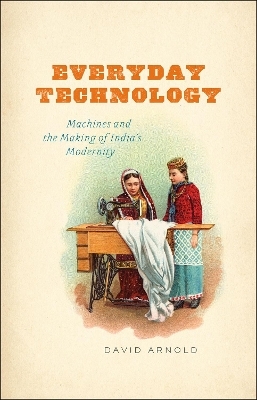
Everyday Technology
Machines and the Making of India's Modernity
Seiten
2015
University of Chicago Press (Verlag)
978-0-226-26937-5 (ISBN)
University of Chicago Press (Verlag)
978-0-226-26937-5 (ISBN)
Showcases how small machines and consumer goods that originated in Europe and North America became objects of everyday use in India in the late nineteenth and early twentieth centuries. The author examines how such technologies became integral to fresh ways of thinking about class, race, and gender, as well as about the politics of colonial rule.
Everyday Technology is a pioneering account of how small machines and consumer goods that originated in Europe and North America became objects of everyday use in India in the late nineteenth and early twentieth centuries. Rather than investigate "big" technologies such as railways and irrigation projects, Arnold examines the assimilation and appropriation of bicycles, rice mills, sewing machines, and typewriters in India, and follows their impact on the ways in which people worked and travelled, the clothes they wore, and the kind of food they ate. But the effects of these machines were not limited to the daily rituals of Indian society, and Arnold demonstrates how such small-scale technologies became integral to new ways of thinking about class, race, and gender, as well as about the politics of colonial rule and Indian nationhood.
Everyday Technology is a pioneering account of how small machines and consumer goods that originated in Europe and North America became objects of everyday use in India in the late nineteenth and early twentieth centuries. Rather than investigate "big" technologies such as railways and irrigation projects, Arnold examines the assimilation and appropriation of bicycles, rice mills, sewing machines, and typewriters in India, and follows their impact on the ways in which people worked and travelled, the clothes they wore, and the kind of food they ate. But the effects of these machines were not limited to the daily rituals of Indian society, and Arnold demonstrates how such small-scale technologies became integral to new ways of thinking about class, race, and gender, as well as about the politics of colonial rule and Indian nationhood.
David Arnold is professor emeritus of Asian and global history in the Department of History at the University of Warwick. Among his numerous works are Science, Technology and Medicine in Colonial India; Gandhi; and The Tropics and the Traveling Gaze: India, Landscape, and Science, 1800-1856.
| Erscheint lt. Verlag | 20.3.2015 |
|---|---|
| Reihe/Serie | science.culture |
| Sprache | englisch |
| Maße | 14 x 22 mm |
| Gewicht | 312 g |
| Themenwelt | Geisteswissenschaften ► Geschichte ► Regional- / Ländergeschichte |
| Geschichte ► Teilgebiete der Geschichte ► Technikgeschichte | |
| Geschichte ► Teilgebiete der Geschichte ► Wirtschaftsgeschichte | |
| Sozialwissenschaften | |
| ISBN-10 | 0-226-26937-X / 022626937X |
| ISBN-13 | 978-0-226-26937-5 / 9780226269375 |
| Zustand | Neuware |
| Haben Sie eine Frage zum Produkt? |
Mehr entdecken
aus dem Bereich
aus dem Bereich
Buch | Softcover (2024)
Lehmanns Media (Verlag)
CHF 27,90
Digitalisierung neu denken für eine gerechte Gesellschaft
Buch | Hardcover (2023)
Quadriga (Verlag)
CHF 27,95
Vom Perceptron zum Deep Learning
Buch | Softcover (2022)
Springer Vieweg (Verlag)
CHF 27,95


